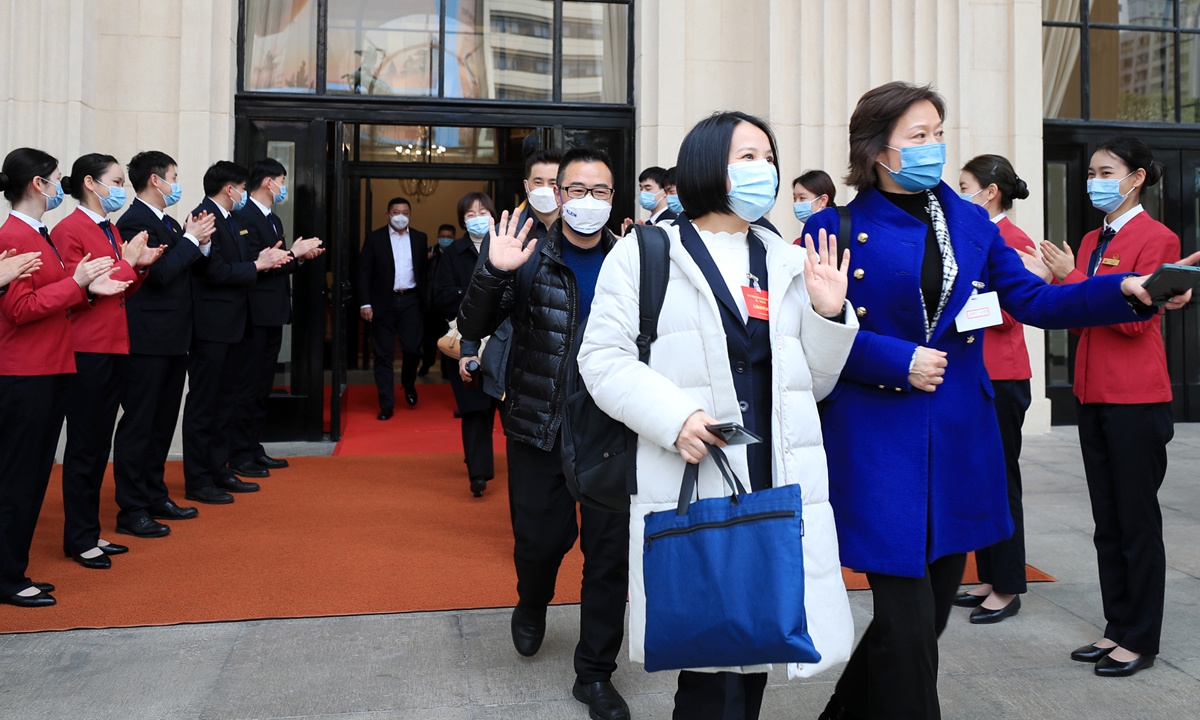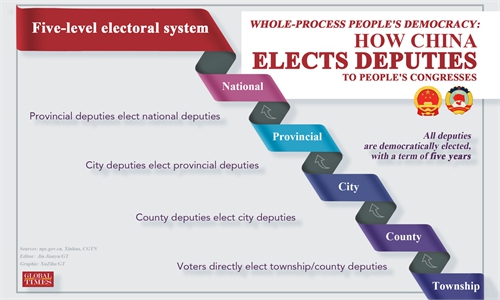
Deputies to the 14th National People's Congress (NPC), China's top legislature, depart for Beijing on March 3, 2023, as the first session of the 14th NPC is about to open in China's capital on March 5. Photo: IC
Editor's Note:Whole-process people's democracy is the defining feature of socialist democracy; it is democracy in its broadest, most genuine, and most effective form. It is best reflected in people's participation in democratic elections, consultations, decision-making, management, and oversight in accordance with the law. From national legislation to daily matters, the Chinese can freely speak their minds and fully participate in consultations and decision-making at the ongoing two sessions. Thus, the two sessions are an important platform for the world to understand whole-process people's democracy. Here are the viewpoints from diplomats and scholars on this concept.
Fariz Mehdawi, Palestinian ambassador to China
In China, what we are talking about here is a different political system. The political system in China is based on the satisfaction of the population at large. It's based on the legitimacy of the people. During the last decade, any fair observer would say that all Chinese are happy about what's happening in their country and they are optimistic about the future. That's really a sign of approval that gives the legitimacy of the system itself and the institution which they are governing.
This is not the case in different countries that pursue liberal democracy. That's why the emphasis of leadership here is about what can do good to the population at large and what is it that the people are expecting. The Party adjusts exactly according to the needs of the people.
After living here in this country for six years, I've been following what's going on in the countryside when I do travelling inside China. They would say we are not happy about this or we are happy about that. It's very dynamic, a kind of interactive democracy, which reaches up to the top level of leadership. So every year, whenever the two sessions are held, those policies would take into consideration the feedback which is coming from the masses. This is quite an experience which doesn't look like other places.
Deborah Veneziale, an American journalist and research fellow with Tricontinental: Institute for Social Research
Living abroad and having to rely mainly on books, social media, and news organizations, doesn't really provide a real-life understanding of how China's democracy functions. However, I had an experience the other day when I was taking a walk in a Beijing residential area that provided a small but particularly insightful example of what people's democracy means.
I came upon a sign that listed four rules of conduct for the area. It was not only the content that intrigued me and provided insight, but it was the order in which the rules were written. They were as follows: "Please Take Care of Children and Elderly"; "Please Do Not Step on the Plants"; "Central Walking Street, Please Slow Down"; and "No Smoking and Tobacco". My immediate reaction was the people-centered approach in asking the residents to be socially responsible and look out for each other and nature.
Democracy isn't an abstract concept; it is not only demonstrated by political structures and governance. There is a very emotional side to China's people's democracy, putting people first not only in the grand scheme of things, but also in the relationships between people, how respectful people are of others and their surroundings. When there is a people's democracy, as evidenced by the way in which the Communist Party of China has established China's true representative government, there is a different feeling that permeates society.
As the Chinese governance structure becomes more inclusive, and the economic, political and social levels of the people are elevated, the people's participation becomes greater and the people's democracy becomes stronger. Compare this to the US where in the last few years many states passed restrictive voting laws. In comparison with the growth of socialism and people's democracy, there is the decay of capitalism.
Xulio Ríos, emeritus advisor of the Observatory of Chinese Politics, a study and analysis working group in Spain
Stability is key to progress in development. This is true for any country, and even more so for China because of its specificity. In this context, it should be pointed out that, first and foremost, democracy must be comprehensive - not only political but also social, economic, and cultural. Progress must be made on all these fronts. We cannot limit it only to a representative exercise.
The second point is adaptation so that each society can concur with elements that it considers convenient. Democracy is like the skeleton of a building, the beams that support coexistence and will ultimately make it habitable, but its internal structure and external appearance may vary.
We cannot underestimate what liberalism has contributed to democracy, nor what other alternative models can contribute, especially at a time like the present, when we are witnessing a crisis of democracy. Such a crisis has its direct origin in transforming hatred into a tool for political construction under the protection of rising far-right politics in many countries. It also has its roots in the system's lack of response to the demands of the social majorities. It is impotent in the face of the deterioration of coexistence and the quality of a democracy that only seems efficient when it comes to the interests of the markets or financial power.


